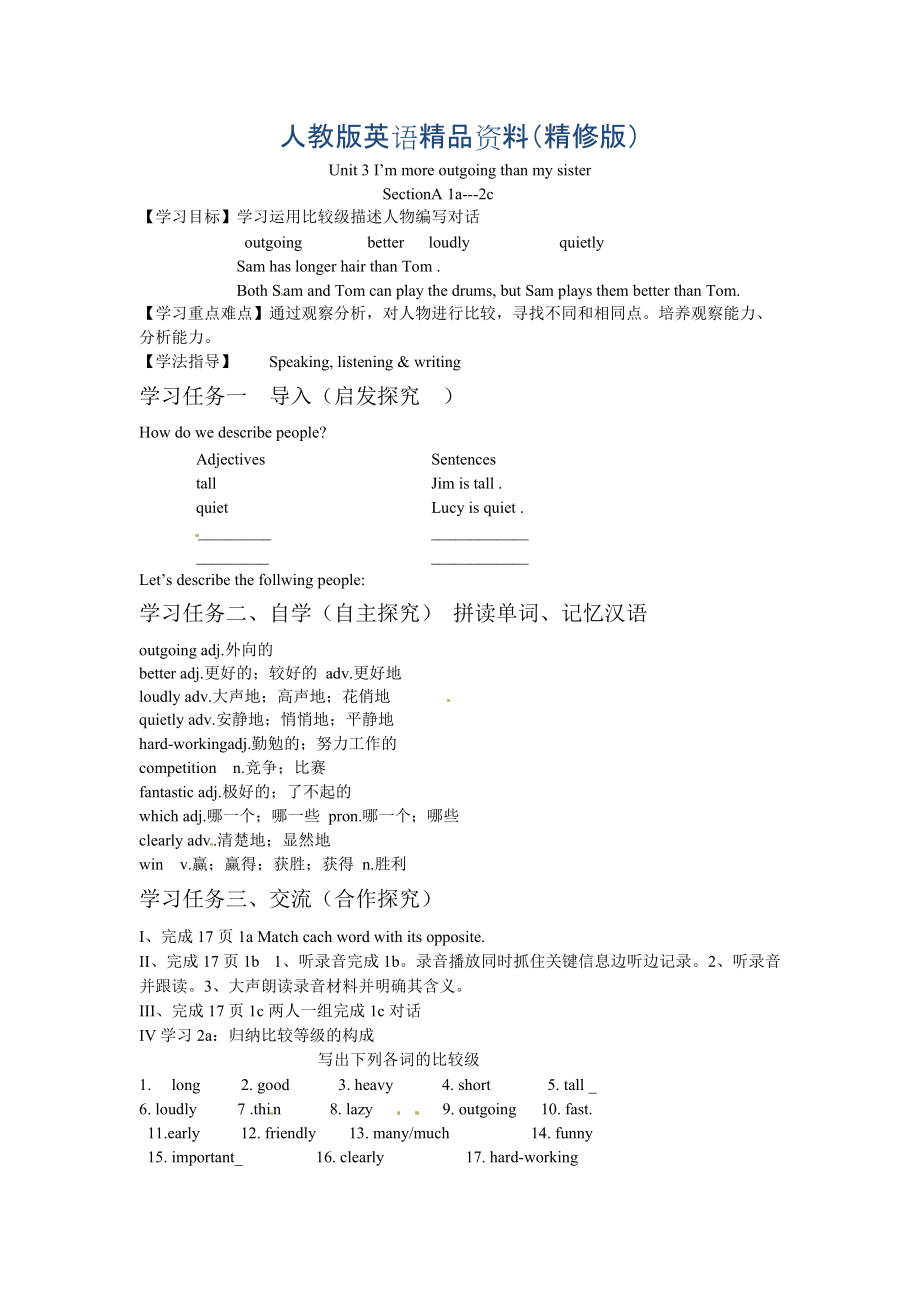《人教版八年級(jí)英語(yǔ)上冊(cè)u(píng)nit 3 第1課時(shí)學(xué)案精修版》由會(huì)員分享���,可在線閱讀����,更多相關(guān)《人教版八年級(jí)英語(yǔ)上冊(cè)u(píng)nit 3 第1課時(shí)學(xué)案精修版(3頁(yè)珍藏版)》請(qǐng)?jiān)谘b配圖網(wǎng)上搜索�����。
1�����、人教版英語(yǔ)精品資料(精修版)
Unit 3 I’m more outgoing than my sister
SectionA 1a---2c
【學(xué)習(xí)目標(biāo)】學(xué)習(xí)運(yùn)用比較級(jí)描述人物編寫對(duì)話
outgoing better loudly quietly
Sam has longer hair than Tom .
Both Sam and Tom can play the drums, but Sam plays them better than Tom.
【學(xué)習(xí)重點(diǎn)難點(diǎn)】通過(guò)觀察分析���,對(duì)人物進(jìn)行比較��,尋找不同和相同點(diǎn)���。培養(yǎng)觀察能力����、分析能力
2��、���。
【學(xué)法指導(dǎo)】 Speaking, listening & writing
學(xué)習(xí)任務(wù)一 導(dǎo)入(啟發(fā)探究 )
How do we describe people?
Adjectives Sentences
tall Jim is tall .
quiet Lucy is quiet .
_________ ____________
_________ ____________
Let’s describe the foll
3�、wing people:
學(xué)習(xí)任務(wù)二��、自學(xué)(自主探究) 拼讀單詞��、記憶漢語(yǔ)
outgoing adj.外向的
better adj.更好的��;較好的 adv.更好地
loudly adv.大聲地��;高聲地���;花俏地
quietly adv.安靜地;悄悄地���;平靜地
hard-workingadj.勤勉的�;努力工作的
competition n.競(jìng)爭(zhēng);比賽
fantastic adj.極好的�;了不起的
which adj.哪一個(gè);哪一些 pron.哪一個(gè)�;哪些
clearly adv.清楚地;
4����、顯然地
win v.贏;贏得�;獲勝;獲得 n.勝利
學(xué)習(xí)任務(wù)三�、交流(合作探究)
I、完成17頁(yè)1a Match cach word with its opposite.
II���、完成17頁(yè)1b 1����、聽(tīng)錄音完成1b���。錄音播放同時(shí)抓住關(guān)鍵信息邊聽(tīng)邊記錄�����。2�����、聽(tīng)錄音并跟讀��。3�、大聲朗讀錄音材料并明確其含義。
III����、完成17頁(yè)1c兩人一組完成1c對(duì)話
IV學(xué)習(xí)2a:歸納比較等級(jí)的構(gòu)成
寫出下列各詞的比較級(jí)
1. long 2. good 3. heavy 4. short 5. tall _
6.
5、loudly 7 .thin 8. lazy 9. outgoing 10. fast.
11.early 12. friendly 13. many/much 14. funny
15. important_ 16. clearly 17. hard-working
1.規(guī)則變化
單音節(jié)詞和少數(shù)雙音節(jié)詞����,加詞尾-er來(lái)構(gòu)成比較級(jí)。
構(gòu)成法
原級(jí)
比較級(jí)
一般單音節(jié)詞末尾加-er���,
tall(高的)
great(巨大的)
taller
greater
以不發(fā)音的
6、e結(jié)尾的單音節(jié)詞和少數(shù)以-le結(jié)尾的雙音節(jié)詞只加-r���,
nice(好的)
large(大的)
nicer
larger
以一個(gè)輔音字母結(jié)尾的閉音節(jié)單音節(jié)詞���,雙寫結(jié)尾的輔音字母��,再加-er
big(大的)
hot(熱的)
bigger
hotter
“以輔音字母+y”結(jié)尾的雙音節(jié)詞�,改y為i�����,再加-er
easy(容易的)
busy(忙的)
easier
busier
其他雙音節(jié)詞和多音節(jié)詞��,在前面加more���,來(lái)構(gòu)成比較級(jí)
important(重要的)
easily(容易地)
more important
more easily
2.不規(guī)則變化
原級(jí)
7���、比較級(jí)
good(好的)well(健康的)
better
bad(壞的)ill(有病的)
worse
old(老的)
older/elder
much/many(多的)
more
little(少的)
less
far(遠(yuǎn)的)
farther/further
V 學(xué)習(xí).2b Listen 1.看圖畫,猜測(cè)Tina和Tara的異同點(diǎn)2.Listen and complete activities 2b .
學(xué)習(xí)任務(wù)四 根據(jù)句意填入單詞的正確形式:
1. My brother is two years __________(old)than me.
2.
8�、 Tom is as ________(fat) as Jim.
3. Is your sister __________(young) than you? Yes,she is.
4. Who is ___________(thin),you or Helen? Helen is.
5. Whose pencil-box is __________(big),yours or hers? Hers is.
6. Mary’s hair is as __________(long) as Lucy’s.
7.Ben ______ (jump) ________ (high) than
9、 some of the boys in his class.
8.______ Nancy sing __________ (well) than Helen? Yes, she _____.
9.Fangfang is not as _________ (tall) as the other girls.
10.My eyes are __________(big) than ________ (she)..
11.Which is ___________(heavy),the elephant or the pig?
12.Who gets up _________(ear
10����、ly),Tim or Tom?
13._____the girls get up_______(early) than the boys?No,they______.
14. Jim runs _____(slow). But Ben runs _____(slow).
15.The child doesn’t______(write) as ____(fast) as the students.
五、【課后反思】通過(guò)本節(jié)課的學(xué)習(xí)我最大的收獲_________________________________
感到自己有待加強(qiáng)的是________________________________________
 人教版八年級(jí)英語(yǔ)上冊(cè)u(píng)nit 3 第1課時(shí)學(xué)案精修版
人教版八年級(jí)英語(yǔ)上冊(cè)u(píng)nit 3 第1課時(shí)學(xué)案精修版

